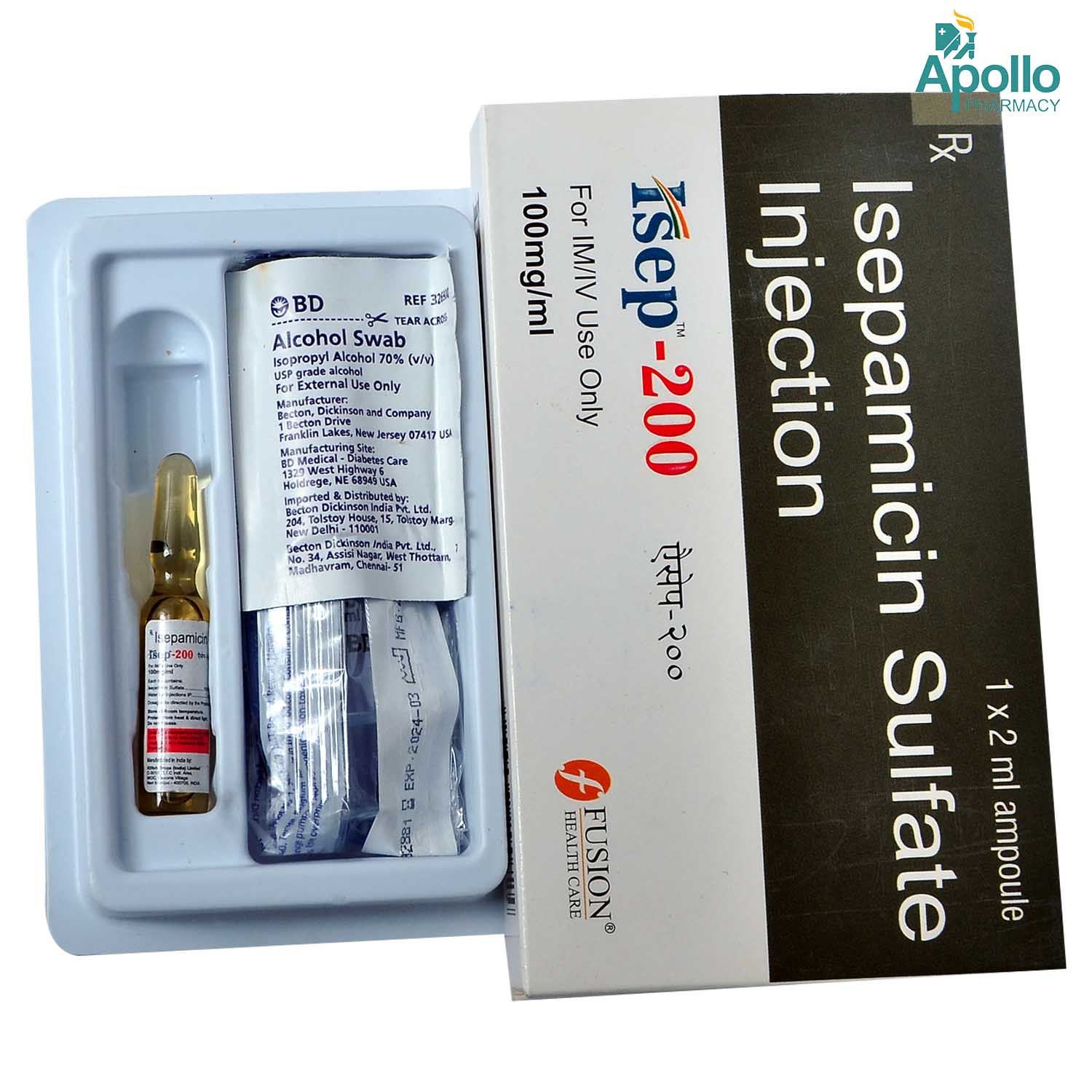Isepamicin
About Isepamicin
Isepamicin belongs to the group of antibiotic medicines called aminoglycosides used to treat bacterial infections such as lower respiratory tract infections, intra-abdominal infections, urinary tract infections, skin and soft tissue infections and septicaemia.
Isepamicin contains Isepamicin, which works by inhibiting bacterial protein synthesis by binding to 30s and 50s ribosomal subunits in susceptible bacteria. Thereby, it helps treat bacterial infections.
In some cases, Isepamicin may cause side effects such as electrolyte disturbances, ototoxicity (hearing or balance problems), and nephrotoxicity (rapid deterioration of kidney function). Talk to the doctor if you experience any side effects.
Let the doctor know if you are allergic to any of the components in Isepamicin. Consult the doctor if you are pregnant or breastfeeding. Keep your doctor informed about your health condition and medications to rule out any side effects/interactions.
Uses of Isepamicin
Medicinal Benefits
Isepamicin belongs to the group of antibiotic medicines called aminoglycosides used to treat bacterial infections such as lower respiratory tract infections, intra-abdominal infections, urinary tract infections, skin and soft tissue infections and septicaemia. Isepamicin contains Isepamicin, which works by inhibiting bacterial protein synthesis by binding to 30s and 50s ribosomal subunits in susceptible bacteria. Thereby, it helps treat bacterial infections.
Directions for Use
- Follow your doctor’s instructions on the dosage and timing of this medication.
- Isepamicin will be administered by a healthcare professional.
- Do not self-administer it.
Storage
Side Effects of Isepamicin
- Electrolyte disturbances
- Ototoxicity (hearing or balance problems)
- Nephrotoxicity (rapid deterioration of kidney function).
Drug Warnings
Do not receive Isepamicin if you are allergic to any of its components. Consult the doctor if you are pregnant or breastfeeding. Inform the doctor if you have myasthenia gravis, obesity, cystic fibrosis, kidney, liver, or hearing problems. Let the doctor know if you are taking any prescription/non-prescription medicines, including supplements or herbal products.
Drug Interactions
Drug-Drug Interactions: Inform the doctor if you are taking antibiotics (vancomycin, ciclosporin), cephalosporins, chemotherapy agents (cisplatin, fludarabine), diuretics (ethacrynic acid, furosemide), opioids, general anaesthetics, neuromuscular blocking agents, beta-lactams, or antihistamine (dimenhydrinate).
Drug-Food Interactions: No interactions found/established.
Drug-Disease Interactions: Inform the doctor if you have myasthenia gravis (muscle problems), obesity, cystic fibrosis (a disorder that damages the digestive system and lungs), or kidney/hearing problems.
Drug-Drug Interactions Checker List:
Safety Advice

Alcohol
consult your doctorIt is not known if alcohol interacts with Isepamicin. Please consult the doctor.

Pregnancy
cautionIsepamicin may not be recommended during pregnancy. If you are pregnant or planning pregnancy, inform the doctor before receiving Isepamicin.

Breast Feeding
consult your doctorLimited information is available. If you are breastfeeding, inform the doctor before receiving Isepamicin.

Driving
consult your doctorIt is unknown if Isepamicin affects your ability to drive. Drive only if you are alert.

Liver
cautionIf you have a history of liver problems, inform the doctor before receiving Isepamicin.

Kidney
cautionIf you have a history of kidney problems, inform the doctor before receiving Isepamicin.

Children
consult your doctorLimited information is available. Please consult the doctor if you have any concerns regarding the usage of Isepamicin in children.
Habit Forming
Diet & Lifestyle Advise
- Include whole grains, fruits, and vegetables in your diet.
- Taking probiotics after antibiotics and eating high-fibre and prebiotic foods may help reduce side effects and support digestion.
- Exercising helps in improving overall health.
- Rest well, and get plenty of sleep.
- Avoid smoking and alcohol consumption.
- Meditation and yoga can help lower stress.
- Avoid processed and fried food.
Special Advise
Regular assessment of renal and auditory function is necessary in patients with additional risk factors.
Patients Concern
Disease/Condition Glossary
Bacterial infection: A bacterial infection is a condition in which harmful bacteria enter, multiply, and infect the body. It can target any body part and multiply very quickly. Generalised symptoms of bacterial infection include fever, chills, and fatigue.
FAQs
Isepamicin is used to treat bacterial infections.
Isepamicin works by inhibiting bacterial protein synthesis. Thereby, it helps treat bacterial infections.
Isepamicin may cause ototoxicity (hearing or balance problems). If you have hearing problems or any concerns regarding this, please consult the doctor.
Isepamicin may be used to treat lower respiratory tract infections (LRTI). However, if you have any concerns, consult the doctor.
Yes, Isepamicin is usually safe and well-tolerated medicine. However, in some cases, it may cause electrolyte disturbances, ototoxicity (hearing or balance problems), and nephrotoxicity (rapid deterioration of kidney function).
Isepamicin is administered by a healthcare professional through an intravenous (IV) infusion or slow injection. Do not self-administer Isepamicin.
As Isepamicin is administered by the doctor, it is unlikely to use a higher than the recommended dose. The doctor will administer a suitable dose based on your medical condition.
Yes, Isepamicin is effective in treating bacterial infections such as lower respiratory tract infections, intra-abdominal infections, urinary tract infections, skin and soft tissue infections and septicaemia.
Consult the doctor if you do not get better even after completing the course of treatment of if you condition worsens during treatment with Isepamicin.
Do not discontinue Isepamicin without consulting your doctor. To treat your condition effectively, complete the duration of treatment as prescribed by the doctor.
Isepamicin may cause side effects such as electrolyte disturbances, ototoxicity (hearing or balance problems), and nephrotoxicity (rapid deterioration of kidney function). Talk to the doctor if you experience any side effects.




